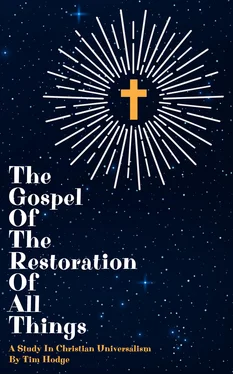THE GOSPEL OF THE RESTORATION OF ALL THINGS
A study in Christian Universalism
By Tim Hodge
AN M-Y BOOKS PAPERBACK

© Copyright 2019
Tim Hodge
The right of Tim Hodgeto be identified as the author of This work has been asserted by him in accordance with the Copyright, Designs and Patents Act 1988
All Rights Reserved
No reproduction, copy or transmission of this publication may be made without written permission.
No paragraph of this publication may be reproduced, copied or transmitted save with the written permission or in accordance with the provisions of the Copyright Act 1956 (as amended).
Any person who does any unauthorised act in relation to this publication may be liable to criminal prosecution and civil claims for damage.
A CIP catalogue record for this title is available from the British Library
ISBN (Print): 978-1-912875-37-5
ISBN (epub): 978-1-912875-40-5
CONTENTS
Introduction
1.The Gospel of the Restoration of All Things
2.The Pre-Existence of the Spirit and the Law of Circularity
3.The Fall of Man
4.The Two Natures of Man
5.God’s Plan of the Ages and the Days of Judgement
6.The Forever/ Until Principle
7.Hell/Deliverance from Hell
8.The Universal Fatherhood of God
9.The Universal Atonement of Christ
10.The Universal Presence of the Spirit
11.The Unforgivable Sin
12.All People Will Become Believers
13.The Law of Reciprocity and the Two Resurrections
14.The Baptism of Fire
15.The Millennium
16.The New Heaven and the New Earth
17.Reconciliation in the Heavens
18.False Gospels
19.The Death and Resurrection of the ‘Sun’ of God
20.The Fulfilment of God’s Plan
Postscript
THE RESTORATION OF ALL THINGS
“Repent therefore and be converted, that your sins may be blotted out, so that times of refreshing may come from the presence of the Lord. And that he may send Jesus Christ who was preached to you before whom heaven must receive until the times of the restoration of all things , which God has spoken by the mouth of all His holy prophets since the world began.”
(Acts 3 v 19-21)
INTRODUCTION
This book is written out of a deep desire to share with people a magnificent truth which I believe has been lost in mainstream Christianity for about 1,800 years. It is called ‘the Gospel of the Restoration of all Things’, and I will be sharing what I’ve discovered over the last 20 years as a follower of Jesus and a student of the Bible.
My first introduction to Christianity was as a child when I attended an Anglican Sunday school. My parents were steeped in Anglican culture and we attended church regularly and learnt about God through Bible stories and the singing of traditional hymns.
The teaching was basically that we should try really hard to be good and to think of others before ourselves, and we thought of Jesus as a good kind teacher who unfortunately was killed but overcame death by rising from the dead. This was my sum understanding of Christianity for many years.
It was as a young adult at the age of 21 that I heard the ‘Evangelical’ version of the Gospel: that God loved me personally and had sent Jesus to die for my sins on the cross and would come to live within me if I asked him in. I immediately believed this was the truth and I knelt down in my room and asked the living Jesus into my life to be my saviour and Lord. Three things followed from this:
1.I knew God was real.
2.I knew I was born again.
3.I knew the Bible was the word of God.
I don’t know how I knew, but I just knew.
In those days I was given a copy of the Bible by those who were mentoring me, and this was a ‘Good News Bible’. I began reading it, but really didn’t understand it, and quickly realised that most Christians I knew didn’t understand it either. Yes, there were certain verses and passages that they would quote and maybe even preach on, but also whole swathes of scripture ignored by most Christians. However, I persevered with it and began attending Evangelical meetings and house groups and listening to as much teaching as I could.
The teaching was basically that God had created this world and given us all a free will, but we had used that free will against God and become guilty sinners. This made God angry with us, and, as sinners, we deserved to be separated from him in hell forever, but God had sent Jesus to die for us, so that if we repented of our sins and trusted Jesus as saviour, God would forgive us and give us eternal life in heaven. This was the Gospel I presumed was true for many years.
I studied many Christian books, listened to endless sermons and Bible studies and quickly realised that within Evangelicalism there were many different versions of the Gospel: Calvinism, Arminianism, Charismatic, Reformed, Pentecostal, and so on.
Some believed in ‘once saved, always saved’; others denied it and taught that the believer was in danger of losing their salvation. There were different baptisms, and some believed in the gifts of the Spirit, while others believed the gifts ended with the Apostles. But the one thing they all had in common was that not everyone would be saved and that most people would end up in the eternal conscious torment of hell!
I began thinking ‘how could this be a Gospel at all?’ After all, the word ‘Gospel’ means ‘good news’ and it seemed really bad news that most people would be lost and end up in hell.
When I asked my Evangelical friends why God created people knowing that they would reject him and end up in hell, I got many trite answers but most just said ‘we can’t know all about God and we have to just leave these things with him.’ But this didn’t satisfy me, and gradually I started to realise that this Gospel (in its various forms) was fundamentally flawed and was a perversion of the original Gospel as revealed in the Bible.
Firstly, I began researching the word ‘hell’, and quickly came to realise that it didn’t mean what traditionalists had said it meant. I also discovered, from the Bible, that hell was not eternal.
It then dawned on me that not only was the fall of man universal but that every person had become a sinner not by his own choice but by being physically descended from Adam.
I then realised that, just as the work of Adam was universal, so the work of Christ was universal and that Jesus had died not just for Christians but for the sins of the whole world, and Paul in his letters seemed to compare the two, showing that the work of Christ undoes the work of Adam.
‘Consequently just as one trespass resulted in condemnation for all people, so also one righteous act resulted in justification and life for all people.’
(Rom 5 v 18 – NIV)
My Evangelical friends said ‘yes, Jesus did die for the sins of the whole world, but it needs personal faith to appropriate that salvation and most will never believe.’
Then I read:
‘At the name of Jesus every knee will bow, of those in heaven, of those on earth and those under the earth. And that every tongue will confess that Jesus Christ is Lord to the Glory of God the Father.’
(Phil 2 v 10-11 NASV)
They then told me that ‘Yes, they will bow and confess, but it will be too late to be saved, there is no chance for people after they die.’ This seemed to be contradicted by Paul who said in Romans that death does not separate us from the love of God, which is in Christ Jesus our Lord (Romans 8 v 38-39) and Peter tells us that the Gospel was preached also to those who are dead, that although their bodies were punished with death they could still live in the spirit as God lives (1 Peter 4 v 6 Living Bible).
Читать дальше













